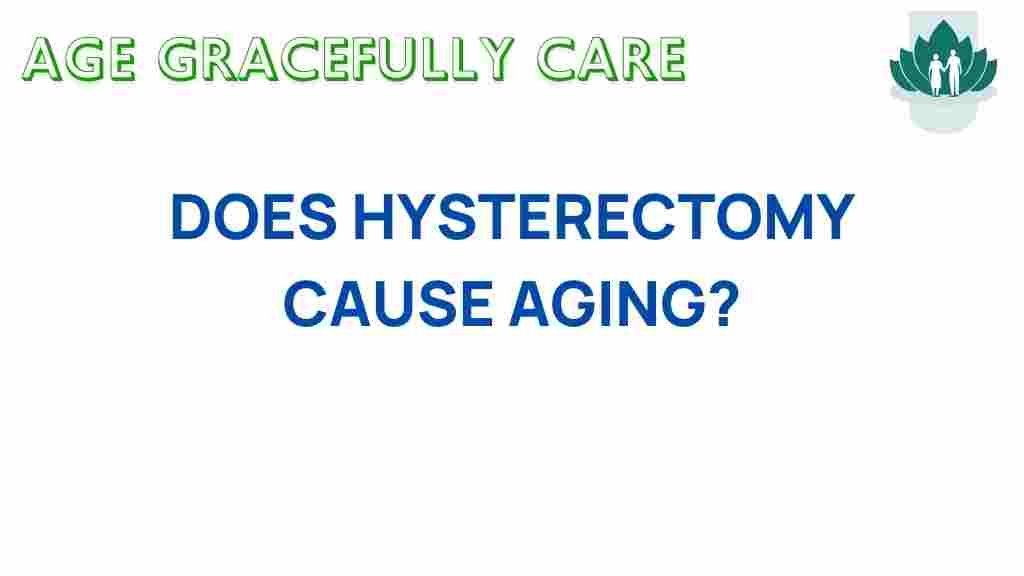Unraveling the Mystery: Does Hysterectomy Accelerate Aging?
When it comes to women’s health, the decision to undergo a hysterectomy can be a significant one. This surgical procedure, which involves the removal of the uterus, is often recommended for various medical reasons, including fibroids, endometriosis, or cancer. However, a common concern among women considering this surgery is whether a hysterectomy accelerates aging. This article aims to explore the relationship between hysterectomy and aging, focusing on the implications for women’s health, hormonal changes, and overall longevity.
Understanding Hysterectomy and Its Purpose
A hysterectomy is a surgical procedure that removes the uterus, and in some cases, the cervix, ovaries, and fallopian tubes. There are several types of hysterectomies:
- Partial (or subtotal) hysterectomy: Removes the upper part of the uterus, leaving the cervix intact.
- Total hysterectomy: Removes the entire uterus and cervix.
- Radical hysterectomy: Removes the uterus, cervix, surrounding tissues, and possibly the ovaries and fallopian tubes, often performed in cancer cases.
The primary reasons women may undergo a hysterectomy include:
- Uterine fibroids
- Endometriosis
- Uterine prolapse
- Abnormal bleeding
- Cancer of the uterus, cervix, or ovaries
The Connection Between Hysterectomy and Aging
To understand whether a hysterectomy accelerates aging, we must delve into how this surgery impacts hormonal changes in women. The ovaries produce hormones like estrogen and progesterone, which play crucial roles in various bodily functions, including:
- Menstrual cycle regulation
- Bone health
- Cardiovascular health
- Mood stability
- Skin elasticity
During a hysterectomy, if the ovaries are also removed (oophorectomy), the body experiences a sudden drop in these hormones, leading to significant hormonal changes. This abrupt change can have various health implications, potentially affecting the aging process.
Hormonal Changes and Their Effects on Aging
Hormonal changes post-hysterectomy can lead to symptoms commonly associated with menopause, especially if the ovaries are removed. These may include:
- Hot flashes
- Night sweats
- Mood swings
- Weight gain
- Decreased libido
- Vaginal dryness
With these changes, many women report feeling older than their actual age. This perception can be linked to both physical and emotional changes resulting from hormonal imbalances.
Menopause and Aging: What to Expect
For women who undergo hysterectomy without ovarian removal, the transition to menopause may still occur, but it could be more gradual. In cases where the ovaries are removed, menopause is typically sudden, leading to immediate and sometimes severe symptoms. The average age of menopause is between 45 and 55, and surgical menopause can occur at any age if the ovaries are removed.
Some studies suggest that early menopause, whether surgical or natural, may increase the risk of certain health issues, such as:
- Osteoporosis
- Cardiovascular disease
- Cognitive decline
- Increased mortality risk
These factors can contribute to the perception that hysterectomy accelerates aging. However, the relationship is complex and may vary from woman to woman.
Health Implications of Hysterectomy
While hysterectomy can provide relief from various health issues, it’s essential to consider both the short-term and long-term health implications. Some potential effects include:
- Physical health: Hormonal changes can lead to increased risks of osteoporosis and heart disease.
- Mental health: The emotional impact of losing reproductive organs can lead to anxiety, depression, or feelings of loss.
- Sexual health: Changes in libido and vaginal health can affect sexual satisfaction.
Recovery and Longevity Post-Hysterectomy
The recovery process following a hysterectomy can vary based on the type of surgery performed, the woman’s overall health, and whether any complications arise. Generally, recovery includes:
- Hospital stay: Most women stay in the hospital for 1-2 days, depending on the surgery type.
- Activity restrictions: Avoiding heavy lifting and strenuous activities for several weeks is recommended.
- Follow-up care: Regular check-ups with a healthcare provider are crucial to monitor recovery and manage symptoms.
In terms of longevity, some studies indicate that women who undergo a hysterectomy may have a similar life expectancy to those who do not. However, the quality of life can be affected by the health implications and hormonal changes associated with the procedure.
Managing the Effects of Hysterectomy on Aging
While the effects of a hysterectomy on aging cannot be entirely avoided, there are steps women can take to manage their health post-surgery:
- Hormone Replacement Therapy (HRT): For some women, HRT can help manage hormonal changes and associated symptoms.
- Regular exercise: Engaging in physical activity can improve mood, boost energy levels, and maintain bone and cardiovascular health.
- Healthy diet: A balanced diet rich in calcium, vitamin D, and antioxidants can support overall health.
- Mental health support: Counseling or support groups can help women cope with emotional changes post-hysterectomy.
Troubleshooting Tips for Post-Hysterectomy Care
As with any surgery, complications can arise after a hysterectomy. Here are some tips for troubleshooting common issues:
- Managing hot flashes: Wear breathable clothing, stay hydrated, and consider discussing natural remedies with your doctor.
- Dealing with mood swings: Engage in regular physical activity and consider mindfulness techniques to manage stress.
- Addressing vaginal dryness: Use water-based lubricants during intercourse and consult a doctor about potential treatments.
Conclusion
In summary, the question of whether a hysterectomy accelerates aging is complex and multifaceted. While hormonal changes post-surgery can lead to symptoms commonly associated with aging, the overall impact varies among women. Understanding the health implications, managing recovery effectively, and taking proactive steps can help mitigate the potential effects of a hysterectomy on aging.
Ultimately, if you are considering a hysterectomy, it is vital to discuss your concerns and treatment options with your healthcare provider to make an informed decision that prioritizes your health and well-being.
For more information on women’s health and surgical procedures, visit this resource. For further reading on managing menopause and aging, check out this article.
This article is in the category Health and created by AgeGracefullyCare Team
